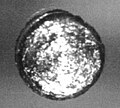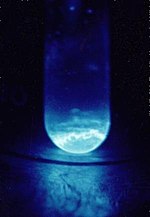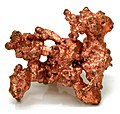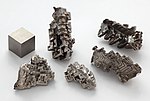Californium(III) nitrate is an inorganic compound of californium and iodine with the formula Cf(NO3)3. It can be used as a precursor to other californium...
3 KB (182 words) - 18:57, 18 October 2024
compounds of californium have been made and studied. The only californium ion that is stable in aqueous solutions is the californium(III) cation. The...
11 KB (1,091 words) - 09:45, 3 April 2024
water-soluble chloride, nitrate, perchlorate, and sulfate and is precipitated as a fluoride, oxalate, or hydroxide. Californium is the heaviest actinide...
43 KB (4,617 words) - 07:40, 6 December 2024
Thulium(III) nitrate is an inorganic compound, a salt of thulium and nitric acid with the chemical formula Tm(NO3)3. The compound forms dark-green crystals...
6 KB (376 words) - 12:27, 3 April 2024
Marçalo; John K. Gibson (2018). "Pentavalent Curium, Berkelium, and Californium in Nitrate Complexes: Extending Actinide Chemistry and Oxidation States". Inorganic...
5 KB (245 words) - 21:07, 17 November 2024
CfF3 Californium(III) iodide – CfI3 Californium(II) iodide – CfI2 Californium(III) nitrate – Cf(NO3)3 Californium(III) oxide – Cf2O3 Californium(III) phosphate...
119 KB (8,721 words) - 20:49, 6 December 2024
Joaquim; Gibson, John K. (2018). "Pentavalent Curium, Berkelium, and Californium in Nitrate Complexes: Extending Actinide Chemistry and Oxidation States". Inorg...
61 KB (7,479 words) - 11:53, 5 December 2024
result of oxidation or reduction of the trivalent californium. Main form is the cubic oxide of californium(III). Greenwood, p. 1268 L.R. Morss; Norman M. Edelstein;...
123 KB (11,580 words) - 12:42, 10 December 2024
LUCA process for the separation of americium(III) from curium(III), californium(III), and lanthanides(III) in acidic solution using a synergistic mixture...
4 KB (299 words) - 13:14, 3 April 2024
(253Es; half-life 20.47 days), is produced artificially from decay of californium-253 in a few dedicated high-power nuclear reactors with a total yield...
67 KB (7,959 words) - 21:59, 9 December 2024
compounds are used in photographic and X-ray film. Dilute solutions of silver nitrate and other silver compounds are used as disinfectants and microbiocides...
95 KB (11,390 words) - 15:49, 5 December 2024
Joaquim; Gibson, John K. (2018). "Pentavalent Curium, Berkelium, and Californium in Nitrate Complexes: Extending Actinide Chemistry and Oxidation States". Inorg...
66 KB (7,821 words) - 09:33, 25 November 2024
permanganate 7783–98–4 AgN3 silver azide 13863–88–2 AgNO3 silver nitrate 7761–88–8 AgO silver(I,III) oxide 1301–96–8 AgONC silver fulminate 5610–59–3 AgPF6 silver...
139 KB (120 words) - 17:07, 15 July 2024
Copper (redirect from Copper(III))
oxyanions form complexes; these include copper(II) acetate, copper(II) nitrate, and copper(II) carbonate. Copper(II) sulfate forms a blue crystalline...
123 KB (14,046 words) - 07:36, 19 December 2024
such as chloride or nitrate and, again, these complexes appear to be more stable than those formed by einsteinium or californium. It is believed that...
32 KB (4,030 words) - 09:27, 25 November 2024
dissolve gallium, forming gallium(III) salts such as Ga(NO 3) 3 (gallium nitrate). Aqueous solutions of gallium(III) salts contain the hydrated gallium...
76 KB (9,063 words) - 16:44, 20 December 2024
Chromium (redirect from Chromium(III))
number of chromium(III) compounds are known, such as chromium(III) nitrate, chromium(III) acetate, and chromium(III) oxide. Chromium(III) can be obtained...
110 KB (12,028 words) - 21:15, 12 December 2024
been studied in great detail. Einsteinium(III) oxide (Es2O3) was obtained by burning einsteinium(III) nitrate. It forms colorless cubic crystals, which...
13 KB (1,358 words) - 09:59, 6 February 2024
Europium (section Eu(II) vs. Eu(III))
conditions. Commonly these compounds feature Eu(III) bound by 6–9 oxygenic ligands. The Eu(III) sulfates, nitrates and chlorides are soluble in water or polar...
38 KB (4,713 words) - 01:56, 30 October 2024
polychalcogenides with cerium(III): cerium(IV) derivatives of S, Se, and Te are unknown. The compound ceric ammonium nitrate (CAN) (NH4)2[Ce(NO3)6] is the...
52 KB (6,137 words) - 20:08, 14 December 2024
bismuth(III) sulfate and sulfur dioxide. 6 H2SO4 + 2 Bi → 6 H2O + Bi2(SO4)3 + 3 SO2 It reacts with nitric acid to make bismuth(III) nitrate (which decomposes...
61 KB (7,017 words) - 16:06, 5 December 2024
bombarding curium-248 or californium-249 with carbon-12: the latter method is more common. Irradiating a 350 μg cm−2 target of californium-249 with three trillion...
39 KB (8,179 words) - 13:49, 5 December 2024
is covalently pound to the borate, similar to californium(III) polyborate. Terbium compounds Californium compounds Thompson, Stanley G.; Seaborg, Glenn...
20 KB (2,308 words) - 05:40, 21 March 2024
Bytownite cadmium Calamine Calcite Calcium Calcium carbonate Calcium oxide Californium calomel Calorimeter Canfieldite Caprazamycin Carbohydrate carbon carbon...
23 KB (1,949 words) - 12:24, 30 July 2024
Indium (section Indium(III))
to form tin isotopes. Indium(III) oxide, In2O3, forms when indium metal is burned in air or when the hydroxide or nitrate is heated. In2O3 adopts a structure...
49 KB (5,846 words) - 16:26, 15 December 2024
Swedish chemist Carl Gustaf Mosander in 1839 as an impurity in cerium nitrate – hence the name lanthanum, from the ancient Greek λανθάνειν (lanthanein)...
48 KB (6,048 words) - 20:52, 14 December 2024
halides is gadolinium(III) chloride (GdCl3). The oxide dissolves in acids to give the salts, such as gadolinium(III) nitrate. Gadolinium(III), like most lanthanide...
46 KB (5,735 words) - 12:40, 5 December 2024
Thallium (section Thallium(III))
Sulfuric and nitric acids dissolve thallium rapidly to make the sulfate and nitrate salts, while hydrochloric acid forms an insoluble thallium(I) chloride...
52 KB (5,787 words) - 10:39, 15 November 2024
hexaaquocobalt(II) [Co(H2O)6]2+ is found in several routine cobalt salts such as the nitrate and sulfate. Upon addition of excess chloride, solutions of the hexaaquo...
117 KB (12,040 words) - 19:49, 22 December 2024
Nickel (section Nickel(III) and (IV))
useful for electroplating nickel. Common salts of nickel, such as chloride, nitrate, and sulfate, dissolve in water to give green solutions of the metal aquo...
89 KB (9,843 words) - 04:46, 21 December 2024




















